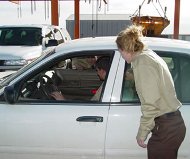Article from: www.thenewspaper.com/news/36/3644.asp
11/21/2011
Louisiana Court Affirms Citizen Right to Make DUI Arrests
Louisiana Court of Appeals clarifies that police are not the only ones who can make DUI arrests.
 Private citizens can arrest other motorists suspected of driving under the influence of alcohol (DUI), the Louisiana Court of Appeals ruled Tuesday. A three-judge panel considered the case of Tracy L. Common who was stopped in Westwego by Gretna Police Detective Brian Rico at 9pm on December 31, 2006. Rico was off-duty and outside his jurisdiction.
Private citizens can arrest other motorists suspected of driving under the influence of alcohol (DUI), the Louisiana Court of Appeals ruled Tuesday. A three-judge panel considered the case of Tracy L. Common who was stopped in Westwego by Gretna Police Detective Brian Rico at 9pm on December 31, 2006. Rico was off-duty and outside his jurisdiction.
That night, Rico saw Common's Chevy S-10 pickup truck swerving on the road and felt the driver was seriously impaired. He activated the lights on his unmarked car and conducted a stop without waiting for the local police to arrive. When Common hopped out of the car, Rico conducted a pat-down search which turned up 50 pills and $1100 in cash. A later search of his car by local police uncovered $2000 and some marijuana.
Though Rico was a police officer, the court assumed he was acting as an ordinary citizen, citing the 2008 appellate case Louisiana v. Lavergne which upheld a DUI traffic stop performed by a volunteer firefighter from Texas.
"Our brethren on the First Circuit held that the defendant's erratic driving was sufficient to justify a stop for the felony offense of aggravated obstruction of a highway of commerce, which authorized a private citizen to make the arrest," Judge Susan M. Chehardy wrote for the Fifth Circuit panel. "In this case, as in Lavergne, Detective Rico observed the defendant driving erratically when his vehicle swerved across three lanes of traffic on the Westbank Expressway and nearly collided with Detective Rico's vehicle.... Here, as in Lavergne, we see no error in the finding that a private citizen who witnessed aggravated obstruction of a highway is authorized to arrest a defendant."
State law allows private citizens to make arrests for felony offenses, and driving in a way that endangers human life qualifies under the highway obstruction statute. As a result of Rico's search, Common was found to be in possession of MDMA or ecstasy, for which he was sentenced to seven years of hard labor. The sentence was later upgraded to ten years after the lower court learned it was Common's fourth felony conviction. Common argued the evidence should be thrown out because it violated his constitutional rights. The court disagreed.
"Evidence seized pursuant to a search by a private citizen, acting in his capacity as a private citizen, is not excluded under the Fourth Amendment because the amendment only protects individuals against governmental intrusion," Chehardy wrote. "Thus, the pills confiscated by the private citizen would not be excluded under the Fourth Amendment."
The judges found procedural errors with the penalty imposed, so they ordered him resentenced. A copy of the decision is available in a 500k PDF file at the source link below.
Source: Louisiana v. Common (Court of Appeals, State of Louisiana, 11/15/2011)
Permanent Link for this item
Return to Front Page
 Private citizens can arrest other motorists suspected of driving under the influence of alcohol (DUI), the Louisiana Court of Appeals ruled Tuesday. A three-judge panel considered the case of Tracy L. Common who was stopped in Westwego by Gretna Police Detective Brian Rico at 9pm on December 31, 2006. Rico was off-duty and outside his jurisdiction.
Private citizens can arrest other motorists suspected of driving under the influence of alcohol (DUI), the Louisiana Court of Appeals ruled Tuesday. A three-judge panel considered the case of Tracy L. Common who was stopped in Westwego by Gretna Police Detective Brian Rico at 9pm on December 31, 2006. Rico was off-duty and outside his jurisdiction.